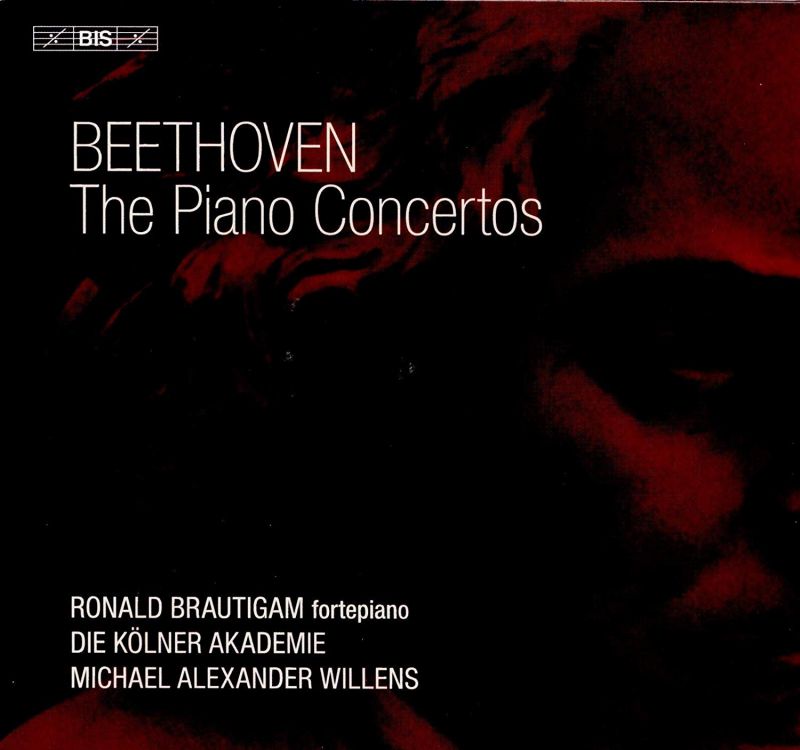BEETHOVEN Piano Concertos Nos 1-5 (Ronald Brautigam)
View record and artist detailsRecord and Artist Details
Composer or Director: Ludwig van Beethoven
Genre:
Orchestral
Label: BIS
Magazine Review Date: 01/2020
Media Format: CD or Download
Media Runtime: 157
Mastering:
DDD
Catalogue Number: BIS2274

Tracks:
| Composition | Artist Credit |
|---|---|
| Concerto for Piano and Orchestra No. 1 |
Ludwig van Beethoven, Composer
Cologne Academy Ludwig van Beethoven, Composer Michael Alexander Willens, Conductor Ronald Brautigam, Fortepiano |
| Concerto for Piano and Orchestra No. 2 |
Ludwig van Beethoven, Composer
Cologne Academy Ludwig van Beethoven, Composer Michael Alexander Willens, Conductor Ronald Brautigam, Fortepiano |
| Concerto for Piano and Orchestra No. 4 |
Ludwig van Beethoven, Composer
Cologne Academy Ludwig van Beethoven, Composer Michael Alexander Willens, Conductor Ronald Brautigam, Fortepiano |
| Concerto for Piano and Orchestra No. 3 |
Ludwig van Beethoven, Composer
Cologne Academy Ludwig van Beethoven, Composer Michael Alexander Willens, Conductor Ronald Brautigam, Fortepiano |
| Concerto for Piano and Orchestra No. 5, 'Emperor' |
Ludwig van Beethoven, Composer
Cologne Academy Ludwig van Beethoven, Composer Michael Alexander Willens, Conductor Ronald Brautigam, Fortepiano |
Author: Patrick Rucker
Ronald Brautigam’s first recording of Beethoven’s piano concertos, a collaboration with Andrew Parrott and the Norrköping Symphony Orchestra, appeared in 2008 10. Included were Brautigam’s reconstruction of the early Concerto, WoO4, the B flat Rondo, the Violin Concerto transcription and the Choral Fantasy. Though Brautigam had already embarked on a project of recording Beethoven’s complete piano music using the fortepiano, he played a modern Steinway for the concertos. However, in this new two-disc set of the five numbered concertos, Brautigam has chosen two fortepianos by Paul McNulty. For the first three concertos, he uses a replica of a Walter & Sohn instrument from 1805; for the last two, a replica of an 1819 Conrad Graf. His collaborators are the Kölner Akademie under Michael Alexander Willens, partners for his recordings of the Mozart solo concertos.
These splendid performances, and the sophistication with which the BIS engineers have captured them, are fresh and invigorating. Textures are bracingly lean, with a lightness and transparency that seems airborne. The winds have an irresistibly gnarly pungency, while horns and trumpets speak with golden, full-bodied resonance. These robust wind-band sonorities juxtaposed with the agility of gut strings provide more than a backdrop for the silvery sounds of the fortepiano; they create a living, verdant environment through which the soloist sings, dances, wanders, cavorts and declaims with abandon. Given the innate dynamic of the classical concerto form, the ensemble here approaches the ideal of chamber music.
The tempos are fleet, a notch or two above the norm. The simpler action of the fortepiano compared to modern instruments, combined with its shallow key dip, makes greater speed possible, even desirable, without sacrificing clarity. And, of course, early 19th-century pianos don’t sustain sound as long as modern ones, suggesting that slow passages move more quickly than they might on a Steinway. Far from being limitations, however, these qualities are simply different. If total timings are generally crude indicators of tempo, comparison of the first movement of the Emperor Concerto nevertheless gives an idea. Brautigam/Willens clocks in at 18'55", Lisiecki/ASMF (DG, 11/19) 20'14", Goode/Iván Fischer (Nonesuch, 2/09) 19'54" and Schnabel/Galliera (1946 – Testament, 3/94) 19'10". The Andante of this G major Concerto (No 4) is even more striking, unfolding in a relatively brisk 3'37". Brautigam’s engagement of the una corda throughout, as Beethoven specified, lends the movement a new dimension of hushed pathos.
There’s nothing pompous or heavy-handed in these readings. Both Brautigam and Willens are alive to Beethoven’s every indication on the page, and that most precious of all commodities in music, the life of the phrase, is sacrosanct. Original, stylish and authoritative, this concerto set is a worthy and thought provoking contribution to the recordings marking the Beethoven year.
Discover the world's largest classical music catalogue with Presto Music.

Gramophone Digital Club
- Digital Edition
- Digital Archive
- Reviews Database
- Full website access
From £8.75 / month
Subscribe
Gramophone Full Club
- Print Edition
- Digital Edition
- Digital Archive
- Reviews Database
- Full website access
From £11.00 / month
Subscribe
If you are a library, university or other organisation that would be interested in an institutional subscription to Gramophone please click here for further information.




